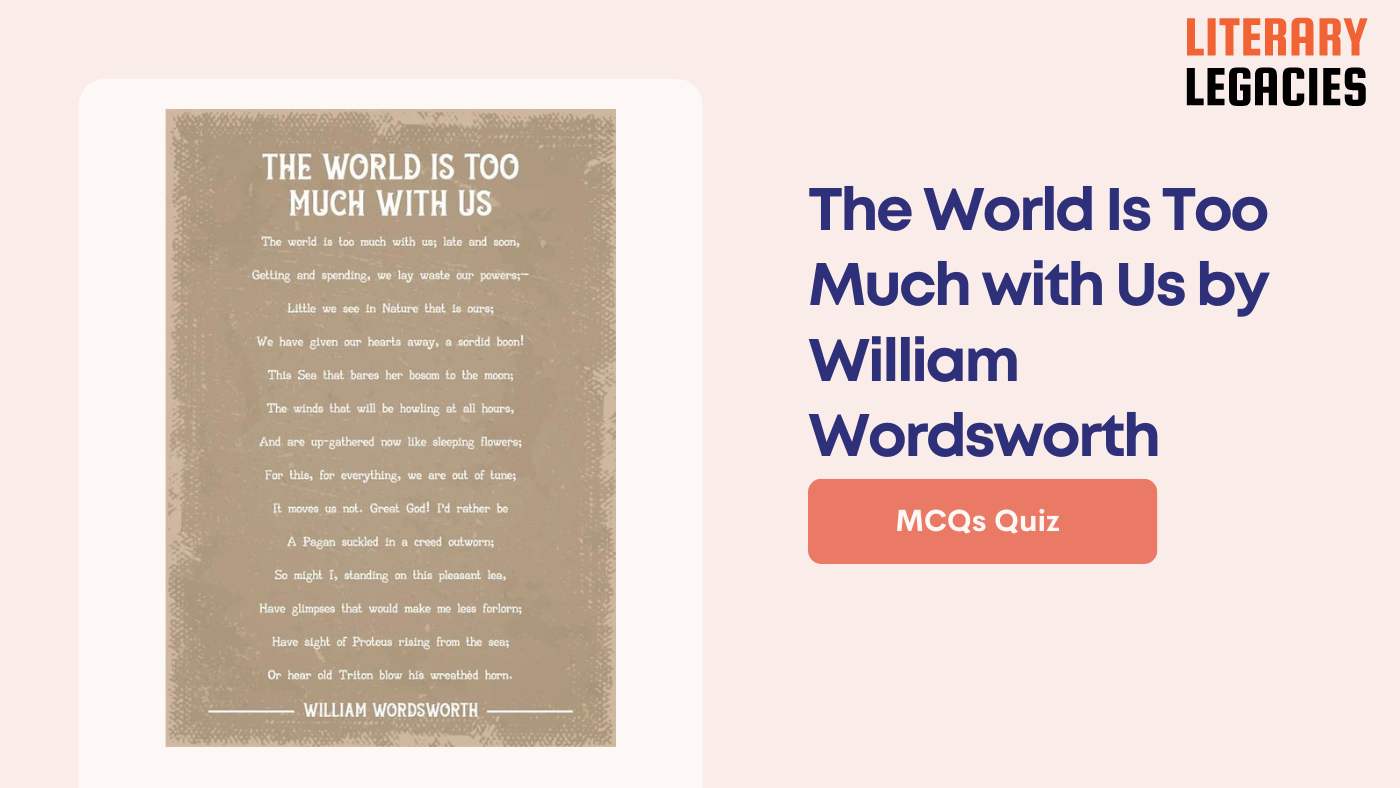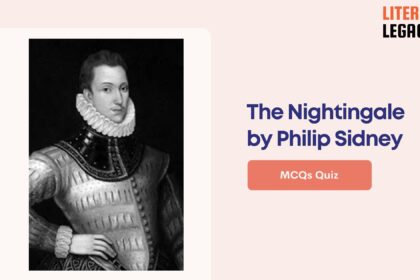1. What is the primary concern of the poem regarding modernity?
A. The struggle for social justice
B. The rise of industrial progress
C. The impact of urban life on the economy
D. The erosion of people’s connection to nature and individual identity
Answer: The erosion of people’s connection to nature and individual identity (D)
The poem explores how modernity has affected people’s connection to nature and their sense of individual identity.
2. What is the result of people’s focus on material things in the poem?
A. They gain a deeper appreciation for nature
B. They lose awareness of their surroundings
C. They become more aware of their surroundings
D. They become more economically stable
Answer: They lose awareness of their surroundings (B)
By focusing their ‘powers’ on material things, people lose awareness of their surroundings.
3. What is implied by the poem’s description of nature as something that can be owned or possessed?
A. Nature is a limited resource
B. Humans have lost the ability to think of their lives in anything but economic terms
C. Humans have a deep connection to nature
D. Humans have lost the ability to think of their lives in economic terms
Answer: Humans have lost the ability to think of their lives in anything but economic terms (B)
The poem implies that humans have lost the ability to think of their lives in anything but economic terms.
4. What is the ‘boon’ referred to in the poem?
A. A symbol of life and emotion
B. A reward for industrial progress
C. A sordid, dirty, and immoral gain
D. A natural resource
Answer: A sordid, dirty, and immoral gain (C)
The poem describes the ‘boon’ as a sordid, dirty, and immoral gain.
5. What is the price of material gain and industrial progress in the poem?
A. The loss of economic stability
B. The destruction of nature
C. The loss of individual identity
D. The human heart itself
Answer: The human heart itself (D)
The poem suggests that the price of material gain and industrial progress is the human heart itself.
6. What is the result of people’s focus on industrial progress in the poem?
A. They become more connected to nature
B. They become more economically stable
C. They reduce themselves to an almost less-than-human state
D. They become more aware of their surroundings
Answer: They reduce themselves to an almost less-than-human state (C)
The poem suggests that people have reduced themselves to an almost less-than-human state in exchange for industrial progress.
7. What is the tone of the poem regarding modern city life?
A. Negative and critical
B. Neutral and indifferent
C. Positive and optimistic
D. Ambivalent and uncertain
Answer: Negative and critical (A)
The poem presents a negative view of modern city life, suggesting that it has led to a loss of connection to nature and individual identity.
8. What is the primary theme of the poem?
A. The impact of urban life on the environment
B. The loss of individual identity and connection to nature
C. The importance of economic progress
D. The struggle for social justice
Answer: The loss of individual identity and connection to nature (B)
The poem explores the loss of individual identity and connection to nature as a result of modernity.
9. What is implied by the phrase ‘We have given our hearts away’?
A. People have given up their emotional lives
B. People have become more connected to nature
C. People have lost their sense of individual identity
D. People have become more emotionally aware
Answer: People have given up their emotional lives (A)
The poem suggests that people have given up their emotional lives in exchange for material gain.
10. What is the overall message of the poem?
A. Modernity is a positive force in society
B. Urban life is the only way to achieve true happiness
C. Industrial progress is the key to human happiness
D. The cost of modernity is the loss of individual identity and connection to nature
Answer: The cost of modernity is the loss of individual identity and connection to nature (D)
The poem suggests that the cost of modernity is the loss of individual identity and connection to nature.
11. What is the primary effect of modern city life on individuals according to the poem?
A. It allows individuals to express their unique characteristics
B. It promotes a sense of community and shared identity
C. It fosters a connection with the natural world
D. It leads to a uniformity of experience
Answer: It leads to a uniformity of experience (D)
The poem suggests that modern city life has led to a loss of individual identity and agency.
12. What does the collective pronoun ‘we’ in the poem’s first eight lines suggest?
A. The individual is fading away in society
B. The speaker is addressing a specific group of people
C. The poem is about a personal experience
D. The speaker is using a poetic device for emphasis
Answer: The individual is fading away in society (A)
The use of ‘we’ implies that the speaker is including themselves in the collective experience of losing individuality.
13. What is the role of the natural world in the poem?
A. A distant and unconnected entity
B. A tranquil counterbalance to the city
C. A chaotic and overwhelming force
D. A source of material gain
Answer: A tranquil counterbalance to the city (B)
The poem portrays the natural world as a space for self-reflection and a counterbalance to the chaotic city.
14. What is the result of people’s focus on material gain in industrial society?
A. The loss of distinguishing characteristics
B. The growth of a sense of community
C. The preservation of individual identity
D. The development of unique skills and abilities
Answer: The loss of distinguishing characteristics (A)
The poem suggests that people’s focus on material gain has led to the loss of unique skills and abilities.
15. What is implied by the phrase ‘We lay waste our powers’?
A. Humans are developing new skills and abilities
B. Humans are using their powers to create progress
C. Humans are wasting their natural talents
D. Humans are using their powers to harm the environment
Answer: Humans are wasting their natural talents (C)
The phrase suggests that humans are not using their unique skills and abilities in industrial society.
16. What is the tone of the poem regarding the loss of individual identity?
A. indifferent and neutral
B. angry and critical
C. celebratory and optimistic
D. melancholic and nostalgic
Answer: melancholic and nostalgic (D)
The poem has a melancholic and nostalgic tone when describing the loss of individual identity.
17. What is the relationship between the natural world and human self-reflection in the poem?
A. The natural world is a source of self-reflection
B. The natural world is irrelevant to self-reflection
C. The natural world is a distraction from self-reflection
D. The natural world is a barrier to self-reflection
Answer: The natural world is a source of self-reflection (A)
The poem suggests that the natural world is a space for self-reflection and learning about oneself.
18. What is the effect of modernity on human experience in the poem?
A. It promotes a sense of community and shared identity
B. It has no impact on human experience
C. It leads to a sense of uniformity and homogeneity
D. It creates a sense of individuality and uniqueness
Answer: It leads to a sense of uniformity and homogeneity (C)
The poem suggests that modernity has led to a loss of individuality and a sense of uniformity.
19. What is the speaker’s attitude towards the sacrifice of individuality for material gain?
A. It is a natural and inevitable consequence
B. It is a tragic and lamentable loss
C. It is a necessary and worthwhile sacrifice
D. It is a neutral and insignificant aspect of modernity
Answer: It is a tragic and lamentable loss (B)
The poem has a melancholic and nostalgic tone when describing the sacrifice of individuality.
20. What is implied by the phrase ‘Little we see in Nature that is ours’?
A. Humans have a deep connection to the natural world
B. The natural world is a source of material gain
C. Humans have lost their connection to the natural world
D. The natural world is a distant and unconnected entity
Answer: Humans have lost their connection to the natural world (C)
The phrase suggests that humans have lost their connection to the natural world and can no longer see themselves in it.
21. What is the significance of the switch from ‘we’ to ‘I’ in the poem?
A. To contrast the general problem with the personal experience
B. To show the speaker’s growing sense of individuality
C. To emphasize the speaker’s role in industrialization
D. To highlight the destruction of nature
Answer: To contrast the general problem with the personal experience (A)
The switch from ‘we’ to ‘I’ marks a shift from a general description of the problem to the speaker’s personal experience within that industrialized society.
22. What does the speaker imply about the power of the individual in the face of broad societal change?
A. That it is limitless
B. That it is unpredictable
C. That it is non-existent
D. That it is limited
Answer: That it is limited (D)
The speaker suggests that the individual is essentially helpless in the face of broad societal change, implying that their power is limited.
23. What is the significance of Proteus and Triton in the poem?
A. They symbolize the destruction of nature
B. They are examples of fantasy and uselessness
C. They embody the values of industrialization
D. They represent the power of the individual
Answer: They are examples of fantasy and uselessness (B)
In the poem, Proteus and Triton are regarded as pure fantasy, highlighting the speaker’s sense of helplessness.
24. How does the speaker view the Greek tradition?
A. As a symbol of individuality
B. As outdated and useless
C. As a representation of material gain
D. As a source of inspiration
Answer: As outdated and useless (B)
The speaker acknowledges the uselessness of the Greek tradition, implying that it is no longer relevant or effective.
25. What is the contrast between the ancient Greek mythical figures and the Christian God?
A. The former are more modern, the latter is more ancient
B. The former are more individualistic, the latter is more homogenizing
C. The former are more powerful, the latter is weaker
D. The former are more materialistic, the latter is more spiritual
Answer: The former are more individualistic, the latter is more homogenizing (B)
The ancient Greek mythical figures are associated with individualism, in contrast to the Christian God, which is associated with homogenization.
26. What is the significance of the ‘pleasant lea’ in the poem?
A. It represents a place of individual imaginative defiance
B. It is a backdrop for the speaker’s emotional turmoil
C. It is a place of pointless idleness
D. It is a symbol of industrialization
Answer: It is a place of pointless idleness (C)
The speaker standing on the ‘pleasant lea’ is engaged in pointless idleness, rather than individual imaginative defiance.
27. What is the tone of the final lines of the poem?
A. One of anger and frustration
B. One of hope and optimism
C. One of indifference and detachment
D. One of despair and dejection
Answer: One of despair and dejection (D)
Despite the possibility of a fresh, more hopeful set of relationships between the individual, society, and nature, the final tone is one of dejection.
28. What is the significance of the poem’s final image of the limitless ocean horizon?
A. It suggests a possibility of change, but no more
B. It represents a new beginning
C. It is a reminder of the destruction of nature
D. It symbolizes the power of the individual
Answer: It suggests a possibility of change, but no more (A)
The final image of the limitless ocean horizon suggests a possibility of change, but it is no more than that – a suggestion.
29. What is the primary concern of the speaker regarding the effects of industrialization?
A. The destruction of nature
B. The decline of the Greek tradition
C. The rise of materialism
D. The loss of individual identity
Answer: The loss of individual identity (D)
The speaker is primarily concerned with the way industrialization has isolated people from nature and partially erased their unique identities.
30. What is the speaker’s attitude towards the idea of individual versatility in the context of industrialization?
A. It is a relic of the past
B. It is a necessary aspect of modern life
C. It is a distant fantasy
D. It is a powerful tool for change
Answer: It is a distant fantasy (C)
The speaker regards individual versatility, as represented by Proteus, as a distant fantasy, highlighting the sense of helplessness.
31. What is the central argument of the poem?
A. Humans can regain their original relationship with nature.
B. Humans have always been disconnected from nature.
C. Industrialization has led to the loss of human appreciation for nature.
D. Material prosperity is more important than nature appreciation.
Answer: Industrialization has led to the loss of human appreciation for nature. (C)
The poem argues that industrialization has led to the loss of human appreciation for nature.
32. How does the poem describe the impact of industrialization on everyday life?
A. It has no impact on human relationships with nature.
B. It destroys the power to appreciate nature.
C. It creates a sense of connection to nature.
D. It only affects urban areas.
Answer: It destroys the power to appreciate nature. (B)
The poem suggests that industrialization destroys the power to appreciate and connect with nature.
33. What is the result of people focusing their ‘powers’ on material objects?
A. They become more wealthy.
B. They remain unaffected.
C. They become less aware of their surroundings.
D. They become more aware of their surroundings.
Answer: They become less aware of their surroundings. (C)
According to the poem, when people focus on material objects, they become less aware of their surroundings.
34. What is the tone of the poem regarding the loss of human connection with nature?
A. Angry
B. Optimistic
C. Indifferent
D. Desperate
Answer: Desperate (D)
The tone of the poem is desperate, arguing that humans have lost their original connection with nature and cannot regain it.
35. What is implied by the phrase ‘we are always late and soon, Getting and spending’?
A. Humans are never busy.
B. Humans never spend money.
C. Humans have all the time in the world.
D. Humans are constantly busy with transactions and appointments.
Answer: Humans are constantly busy with transactions and appointments. (D)
The phrase implies that humans are constantly busy with transactions and appointments.
36. What is the result of the urban lifestyle on human relationships with nature?
A. Humans identify more with nature.
B. Humans only appreciate nature on weekends.
C. Humans destroy their power to identify with nature.
D. Humans remain unaffected.
Answer: Humans destroy their power to identify with nature. (C)
The poem suggests that the urban lifestyle destroys humans’ power to identify with nature.
37. What is implied by the phrase ‘nothing in nature—or elsewhere—is “ours”’?
A. Everything in nature belongs to everyone.
B. Everything can be won or lost in an instant.
C. Nature is not important.
D. Nature is only for the wealthy.
Answer: Everything can be won or lost in an instant. (B)



